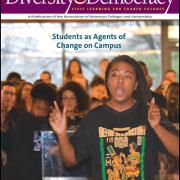Ongoing Anti-Racist Initiatives

The Center for Teaching and Learning has been very intentional about engaging in diversity, inclusion, and equity work at many levels at the College as well as in our personal and professional lives. However, we believe that anti-racist work necessitates engaging on a systems and organizational level which we cannot do as an isolated department. So, while we believe that the work we lay out below supports the College in doing anti-racist work, this work will not see its potential unless we are jointly defining anti-racism, articulating anti-racism as an explicit value, and aligning our work across departments and divisions, across positions and perspectives. We are committed to assessing our internal practices and outward facing support and programming to help Amherst College address systemic inequities and marginalizing practices in order to grow toward being an anti-racist institution.
Overall, our goal is to support the College in having a diverse community whose members have equitable access to success and feel meaningfully included in that community. The work of the CTL is primarily faculty-facing, but directly impacts students and increasingly involves students, and we do our work in collaboration with staff across the campus so our goals intentionally embrace all of these members of our community. In order to attend to all of our community in the work of DEI our specific goals are:
Build an expert community of teaching and learning practitioners in which all members of the community feel equitably invested in and responsible for the learning environment and are also agents who are empowered by the structures, policies, culture, and practices at all levels of the institution to change and sustain a positive and productive learning environment.
Expand integration of evidence-based innovative and inclusive learning practices through inclusive staff, student, and faculty partnerships that increase understanding of our complex identities and how those identities impact engagement, recognize and take advantage of positional expertise, and prioritize inclusive process over demonstrative production.
Cultivate a culture that values evidence-based understanding of student success in the Amherst College classroom in such a way that centers student-articulated goals for their education in alignment with institutional values and utilizes equity-minded assessment frameworks and strategies.
The work that we are doing to accomplish these goals, which directly align with our existing strategic priorities, includes (but is not limited to) engaging in individual faculty and departmental consultations, working at the course and curricular level on multiple initiatives to increase access and inclusion, establishing and sustaining a students as partners program (i.e. O’Shea, 2018 and Elon College), and hosting workshops in which we intentionally ensure a broad range of demographic representation of speakers/experts (i.e. staff, students, faculty, racial and gender identity, rank, discipline), create structures for de-centering pedagogical expertise, and address topics which support evidence-based, inclusive teaching practices. Additionally, we are hiring experts to help us increase our expertise in equity-minded, evidence-based assessment for our own programming as well as course and curricular focused assessment. We have outlined three primary criteria for decision-making as we engage in this work - not as experts, but as continuous learners:
Is this collaborative? (Who are the stakeholders? Are they included in the process? Are we attending to process over expediency and production? Are we helping to break down various positional silos? Are we making decisions that privilege equity over individualized response?)
Does this uplift and empower our community? (Does this build agency and trust? Do we have the resources and agency we need to do our best work? If not, how do we ask in ways that empower our community and not just ourselves? Are we drawing on, acknowledging, and making visible knowledge, skills, and expertise of our community?)
Are we being sufficiently transparent? (Are we naming and addressing possible barriers to engagement? Are we gathering and asking for disaggregated data? Are we conveying our decision-making processes? Are we effectively communicating with our stakeholders? Are we documenting and communicating our processes and decisions? Are we seeking out collective meaning-making?)